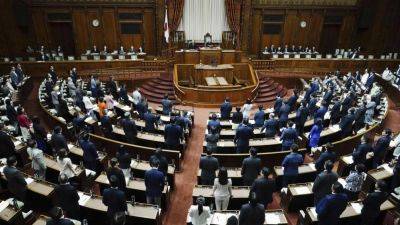Japanese yen strengthens sharply after hitting 160 against dollar for the first time since 1990
The Japanese yen weakened to 160 against the U.S. dollar in Monday morning trading in Asia.
The yen briefly touched 160.03 against the dollar, the weakest level since April 1990 when it touched 160.15, according to FactSet data. The currency strengthened by midday to trade around 156.5 against the dollar.
The Commonwealth Bank of Australia said Japan's Ministry of Finance is expected to publish Tuesday its market intervention statistics for March 28 to April 26. It said, however, "We have not seen any media reports that confirm intervention."
"Today's JPY volatility may reflect the skittishness of markets amid thin liquidity. We will unlikely receive comments from Japanese officials today because Japan is on holiday," the bank said.
Japanese authorities have repeatedly warned against "excessive" moves in the yen, but have made no official announcements about bolstering the currency. Some market watchers had suspected authorities would intervene at the 155 level, but the yen slid past that mark last week.
The currency has languished alongside continued strength in the greenback as Federal Reserve rate cut expectations get pushed back. The Fed's preferred inflation gauge came in slightly hotter than expected on Friday, underlining the difficulty the U.S. central bank faces in tackling sticky inflation.
The yen has traded around 150 or weaker against the dollar since the Bank of Japan ended its negative interest rate regime in March. On Friday, the central bank held rates and slightly raised its inflation expectations for fiscal 2024.
Vincent Chung, associate portfolio manager for T. Rowe Price's diversified income bond strategy, noted that officials seem more focused on volatility in the currency, rather than specific levels.
"The







